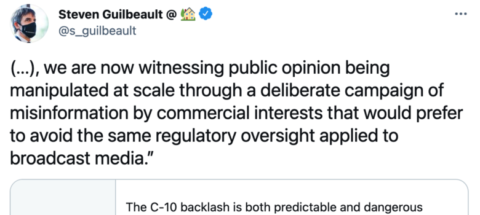It’s long since got to the point that you never can take a Liberal cabinet minister’s word without verifying it for yourself. Today’s example is the constant denial from the government that their Bill C-11 would enable censorship of things like YouTube videos by the CRTC. In a Senate appearance on Wednesday, the head of the CRTC agreed that such censorship is allowed under the proposed legislation:
CRTC Chair Ian Scott appeared before the Standing Committee on Canadian Heritage yesterday and Bill C-11 proved to be a popular topic of discussion. The exchanges got testy at times as Scott seemingly stepped outside of his role as an independent regulatory by regularly defending government legislation, even veering into commenting on newspapers, which clearly falls outside the CRTC’s jurisdiction. With respect to Bill C-11, most newsworthy were two comments regarding the regulation of user content and the timelines for implementing the bill if it receives royal assent.
First, Scott was asked about the regulation of user content, confirming what has been obvious for months despite denials from Canadian Heritage Minister Pablo Rodriguez. The following exchange with Conservative MP Rachael Thomas got Scott on the record:
Thomas: Bill C-11 does in fact leave it open to user generated content being regulated by the CRTC. I recognize that there have been arguments against this, however, Dr. Michael Geist has said “the indisputable reality is that the net result of those provisions is that user generated content is in the bill.” Jeanette Patel from Youtube Canada said “the draft law’s wording gives the broadcast regulator” – in other words you – “scope to oversee everyday videos posted for other users to watch.” Scott Benzie from Digital First Canada has also said that “while the government says the legislation will not capture digital first creators, the bill clearly does capture them.”
So all these individuals are individual users creating content. It would appear that the bill does, or could in fact, capture them, correct?
Scott: As constructed, there is a provision that would allow us to do it as required.
While Scott continued by arguing that the Commission already has equivalent regulatory powers and is not interested in regulating user content, the confirmation that Bill C-11 currently does cover user generated content should put an end to the government’s gaslighting that it does not.









